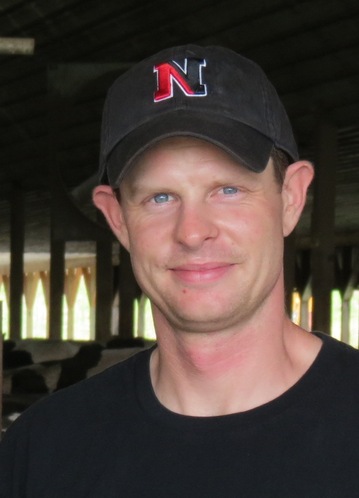By Doug Struck
Globe Correspondent
The massive Farm Bill, now locked in a House-Senate dispute over food stamps, has traditionally included so many programs there is something for everyone. One program helped Matthew Maxwell get back to his family farm by making electricity from cow manure.
Maxwell, 33, graduated from Northeastern University in 2003 uncertain about the future of his grandparents’ dairy farm near Newport, upstate Vermont. It was being run by Maurice and Lois Maxwell’s four sons, but “the dairy industry is very volatile. Milk prices go up, and they go down. There’s a lot of flux,” – enough that the future of the farm with 750 milking cows was uncertain, he said.
 Matt Maxwell stayed in Boston and worked for State Street Bank for a few years. But then he heard of a program that gives grants and loans for innovative environmental power projects on farms, called the Rural Energy for America Program.
Matt Maxwell stayed in Boston and worked for State Street Bank for a few years. But then he heard of a program that gives grants and loans for innovative environmental power projects on farms, called the Rural Energy for America Program.
The program, created under the 2002 Farm Bill, is intended to finance efforts that create clean energy, help the environment, and help farmers. Maxwell cobbled it together with another effort in Vermont called “Cow Power” to do all three.
Methane from livestock is a significant—some say underappreciated– contributor to the greenhouse gases now heating up our planet. For about $2 million, Maxwell and his family built a “digester” on the farm. Manure from the cows is pumped into a 16-foot vat, where it is cooked at 100 degrees. The natural bacteria break down the manure, killing pathogens and creating methane gas. The gas is funneled off to propel an engine that drives a generator that can produce up to 225 kilowatts— roughly enough electricity to light up 200 homes.
The heat from the engine also is captured and used both as the main source for cooking the manure but also to heat several buildings on the farm, including a greenhouse for vegetables. The leftover slush from the vat is squeezed: liquid goes on the fields as a fertilizer, and the solids are dried and used for cow bedding. It’s a “closed system” in which no energy is wasted.
Environmental groups applaud the program. In a 2010 report, the Environmental Law and Policy Center said the program has helped thousands of farmers and ranchers create solar, wind, energy efficiency and biogas projects. These “success stories,” are helping “pioneer the next generation of American energy,” the report says.
Maxwell doesn’t argue with that, but he is honest about his motivation. “The ecological imperative is good. We understand farms release a lot of greenhouse gases. But the top priority was to keep the farm, to save the farm,” he said by telephone from his farm office.
By selling the electricity to the Vermont utility at the premium price of 14 cents a kilowatt set by the state, Maxwell said he will pay off the digester by 2015 and reap a steady stream of profits from the sale of the power, while also drastically cutting his own farm’s utility bills.
The experiment did not come cheap for taxpayers. The REAP program gave the Maxwells a $358,000 grant for program, and guaranteed a $327,000 loan that will be repaid. The state and Vermont Public Service kicked in another $425,000 in grants and loans. Maxwell said the project will give the farm a steady second source of income and allow it to keep hauling milk to the local co-op.
“Financially, it’s good,” he said. Environmentally it’s good. And taxpayers, he said, “are getting renewable energy and they are helping reduce the amounts of greenhouse gases going into the environment.” There’s one other benefit: the cooking process greatly reduces the odors of manure, which used to waft up from a foul holding lagoon on the farm, he said. “Our neighbors are a lot happier than they were five years ago.”